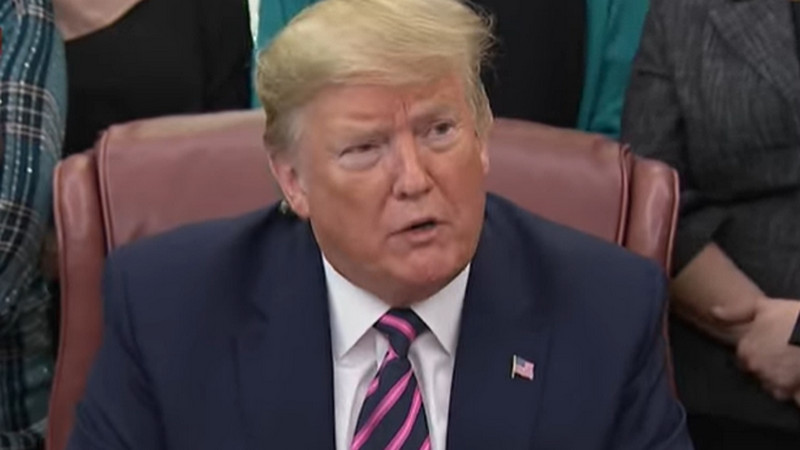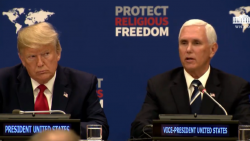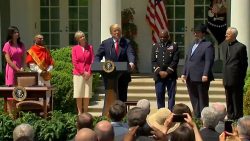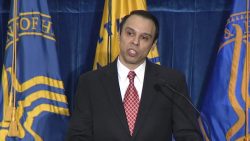President Donald Trump, cheered on by his conservative evangelical supporters, celebrated National Religious Freedom Day on Jan. 16 by undermining the separation of church and state and strengthening the ability of religious social service organizations to discriminate against some Americans while using federal tax dollars. Reps. Jared Huffman, D-CA, and Jamie Raskin, D-MD, founders of the Congressional Freethought Caucus, called the Trump administration’s actions an “affront to the Constitution.”
National Religious Freedom Day commemorates the 1786 Virginia Statute of Religious Freedom, which informed the crafting of the First Amendment to the United States Constitution. In his autobiography, Jefferson wrote that the religious freedom law was meant to be “universal”; he celebrated that its protections applied to Jews, Muslims, Hindus, and the “Infidel of every denomination,” as well as to different kinds of Christians.
But there’s an industry of conservative Christian activists dedicated to spreading a different vision of our founding and our ideals and claiming that the U.S. was founded by and for Christians. Some argue, for example, that the First Amendment’s religious liberty protections do not apply to American Muslims or Mormons.
Trump’s presidency has greatly expanded the political power and influence of religious-right activists who see the separation of church and state not as an essential protection for religious freedom, but as a “lie” that obstructs them from marshaling governmental power to turn their religious beliefs into policy.
That power was on display last Thursday as a number of federal agencies rolled out new rules designed to give religious organizations privileged status to take tax dollars while ignoring regulations that conflict with their religious beliefs.
White House Domestic Policy Council Director Joe Grogan told reporters that the rules “will ensure that religious and non-religious organizations are treated equally by the federal government and that organizations are not discriminated against simply because they are religious in nature.” In this rhetorical misdirection, “not discriminated against” means “not held to the same nondiscrimination standards as everyone else who takes federal funds.” (This is the same Joe Grogan who last month praised the “pro-family” policies of Hungary’s authoritarian leader Viktor Orbán.)
The administration is saying, in effect, that governments can never exclude religious institutions from access to publicly funded programs—while simultaneously decreeing that those institutions don’t have to abide by the same rules as other organizations.
And the Trump administration wants to impose this dual standard on state and local governments as well, overriding state and local nondiscrimination laws—and even state constitutional provisions that prevent taxpayer dollars from being used to support religious education.
When a reporter asked about organizations that might cite religious beliefs to justify discrimination against “those of other races or religions or sexual orientations,” an administration official responded by offering assurances that the new rules would not do away with regulations that forbid federally funded programs from discriminating on the basis of religion. But no one mentioned that the Trump administration has already weakened those protections against religious discrimination. Last year, the Department of Health and Human Service provided a waiver allowing taxpayer-funded foster care and adoption agencies in South Carolina to discriminate against potential parents who are Catholic or Jewish or otherwise do not meet the agency’s particular conservative evangelical religious test.
The religious right and its political allies have been building toward this moment for decades, creating an extensive institutional infrastructure to mobilize resentment against school desegregation, church-state separation, feminism, abortion, LGBTQ rights, and growing diversity.
Candidate Trump witnessed the growing power of the Christian right in the Republican Party and offered its leaders a deal that essentially amounted to this: Put me in the White House, and I’ll make you even more powerful. They took the deal, and he’s come through for them, filling federal agencies and the federal courts with ideologues that the right wing is counting on to give their worldview the force of law—and eliminating a right to abortion and reversing progress toward racial equity and equality for LGBTQ people. He’s given them an attorney general who denounces secularism. And they’re pouring their energies into “Project Blitz,” an organized effort by the Christian right to promote passage of state-level legislation to weaken church-state separation.
National Religious Freedom Day is meant to recognize a powerful ideal: that in this country, people of every faith and people who don’t practice religion have equal standing. America’s peaceful religious pluralism reflects that ideal, and the separation of church and state protects it. As Team Trump trashes these and so many other constitutional principles, let’s rise to their defense.









